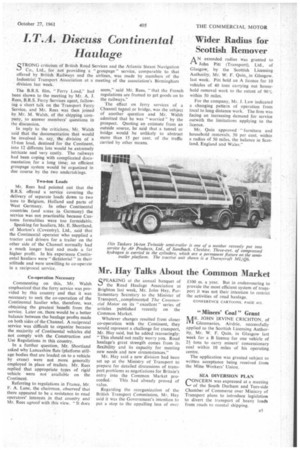Discuss Continental Haulage
Page 39

If you've noticed an error in this article please click here to report it so we can fix it.
STRONG criticism of British Road Services and the Atlantic Steam Navigation Co., Ltd., for not providing a " groupage " service, comparable to that offered by British Railways and the airlines, was made by members of the Industrial Transport Association at a meeting of the association's Birmingham division last week.
The B.R.S. film, "Ferry Load," had been shown to the meeting by Mr. A. J. Rccs, B.R.S. Ferry Services agent, following a short talk on the Transport Ferry Service, and Mr. Rees was then joined by Mr. M. Walsh, of the shipping company, to answer members' questions in the discussion.
In reply to the criticisms, Mr. Walsh said that the documentation that would be involved in, say, the division of a I5-ton load, destined for the Continent, into 12 different lots would be extremely intricate and very costly. The railways had been coping with complicated documentation. for a long time; an efficient groupage system would be organized in due course by the two undertakings.
Two-ton Loads Mr. Rees had pointed out that the B.R.S. offered a service covering the delivery of separate loads down to two tons to Belgium, Holland and parts of West Germany. In other Continental countries (and areas in Germany) the service was not practicable because Customs formalities were too formidable.
Speaking for hauliers, Mr. E. Shortland. of Morton's (Coventry), Ltd., said that the Continental operator who supplied a tractor and drivers for a trailer on the other side of the Channel normally had a much longer haul and made a far higher profit. In his experience Continental hauliers were " dictatorial " in their attitude and were unwilling to co-operate in a reciprocal service.
Co-operation Necessary Commenting on this, Mr. Walsh emphasized that the ferry service was provided by this country and that it was necessary to seek the co-operation of the Continental haulier who, therefore, was obtaining the greatest benefit from the service. Later on. there would be a better balance between the haulage profits made on both sides of the Channel. A reciprocal service was difficult to organize because the majority of Continental vehicles did not comply with the Construction and Use Regulations in this country.
In a further question, Mr. Shortland asked why Lancashire flats (platform stillage bodies that are loaded on to a vehicle by crane) were not more generally employed in place of trailers. Mr. Rees replied that appropriate types of rigid vehicle were not available on the Continent.
Referring to regulations in France, Mr. F. A. Lane, the chairman, observed' that there appeared to be a resistance to road operators' interests in that country and Mr. Rees agreed with this view. "It does seem," said Mr. Rees, "that the French regulations are framed to get goods on to the railways."
The effect on ferry services of a Channel tuimel or bridge, was the subject of another question and Mr. Walsh admitted that he was " worried " by the prospect. Quoting an estimate from an outside source, he said that a tunnel or bridge would be unlikely to abstract more than 15 per cent, of the traffic carried by other means.




















































































































